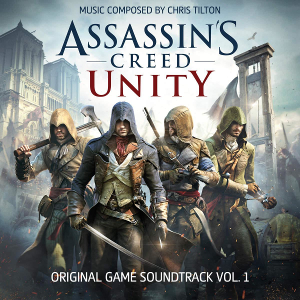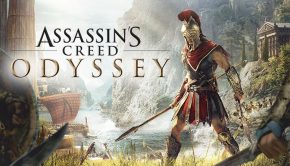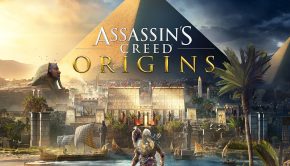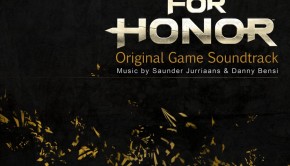Assassin’s Creed -Unity- Original Game Soundtrack Vol. 1
 |
Album Title: Assassin’s Creed -Unity- Original Game Soundtrack Vol. 1 |
| Record Label: Ubisoft |
|
| Catalog No.: N/A |
|
| Release Date: November 11, 2014 |
|
| Purchase: Download at iTunes |
Overview
Assassin’s Creed: Unity is the story of Arno, a young man during the French Revolution who is seeking revenge for the murders of his father and his ward, both killed in the struggle between Assassins and Templar orders. The soundtrack to the game was mainly divided between two composers: Sarah Schachner, a freelance composer who made a several contributions to Bryan Tyler’s score for Assassin’s Creed IV: Black Flag, and Chris Tilton, who has more notably worked alongside Michael Giacchino and scored multiple seasons of the J. J. Abram’s sci-fi television series Fringe. Tilton scored Volume 1 of the score, which includes the music for the main storyline in the game and all the single-player action, while Schachner scored Volume 2, which covers the multiplayer portion of the game. We felt it would work best to cover the albums in two different reviews, as not only are they extremely different, with only one very small thematic similarity, but they must also be purchased separately on both Amazon and iTunes.
Body
Thematically speaking, Tilton’s approach to the soundtrack was to create a four-note motif that saturated the album, along with delicate hints of the “Ezio’s Family” theme from Assassin’s Creed II. Themes from earlier Assassin’s Creed games have traditionally not been passed along to the next game, with each soundtrack instead essentially starting from the ground up. However, composers of both the Unity and Rogue games seem adamant on taking advantage of the previous scores, despite the fact that neither Rogue nor Unity has anything more to do with the second game than any other game in the series. Though not all will agree, I personally liked this idea; the Assassin’s Creed games have had wonderful, rich scores in the past, and frankly I have been looking for an “Assassin’s Creed Theme” since the very first game.
Both the new and old themes first appear in the opening track of Tilton’s score. “Unity” begins with Ezio’s theme on celli, which quickly transitions to the new theme with the same instrumentation, accompanied by some tremolo ornamentation in the upper strings. The melody gradually ascends above the tremolo to become a darkly imposing piece. That theme sticks around for most of the soundtrack, with some positive and negative effects. On one hand, the music becomes much more streamlined and recognizable that it does, for example, in Rogue, or even in the first two Assassin’s Creed games, which had themes but which rarely showed up in-game. On the other hand, there isn’t much else in the way of thematic content other than this four-note motif, which shows up in most of the tracks in the album, which makes the score a bit more one-dimensional than it might have been otherwise.
The theme is a good one, though, and Tilton certainly makes use of his skill in variations. “A Leap of Faith” is one example, which stretches the theme out across several fluidly shifting keys before ending with a beautiful rendition of Ezio’s theme. The piece essentially continues straight into the next track, “Welcome to the Brotherhood,” which pairs Ezio’s theme with “Earth,” the opening track from Assassin’s Creed II. Tilton seems to be using Ezio’s theme as the theme of the Brotherhood, as it shows up during most moments involving the rituals and rites revolving around the assassins as a group (as opposed to Arno’s own personal vendetta and story).
I had been looking forward to the soundtrack of this game since it was first announced, because out of the entire Assassin’s Creed series, the setting of this game in particular is a musically rich setting. Between 1700 and 1900, I can point out almost all of my favorite European composers, whether they are Italian, French, Spanish, or Germanic. For whatever reason, Tilton did not really take advantage of this musical era, which I found disappointing. That said, “On Father’s Watch” seems to be a musical nod to the aristocracy of the time period, a gentle waltz with harp, high strings, and piano that brings a very different feel to the album. The main story of the game begins in Versailles, and the delicate ornamentation and sophistication of “On Father’s Watch” lend themselves well to the society depicted in the game. That said, it’s only a faint nod, and does not seriously address any of the accompanying musical customs.
“Chase by Chase Basis” is another track that does not fully incorporate the four-note motif. While it begins several times during the track, it never finishes, which I appreciated. The ability to do more with less musical material is one I appreciate, particularly in soundtracks where the exact same motif can become tiresome very quickly. However, it’s never completed in “Chase by Chase Basis,” which resultedly becomes a slightly brighter piece in the score. “Belle of the Balloon” is one of the longest tracks of the score, and perhaps one of the most self-contained, as well. Tilton introduces some new content at the beginning of this piece which quickly moves into a variation of the main theme, but the brief shift of pace and chords gives the listener a nice break the pattern of the rest of the album. The piece is consistently accompanied by a rapid percussion sequence that extends for the entire duration, leading to a well-developed realization of the main theme of the game.
One of the final tracks of the game is “Ou la Mort,” a surprisingly gentle and refined piece that takes chords and progresses them slowly, note by note, instrument by instrument. The texture varies, from solo soprano to strings to piano. As the piece continues it becomes less tranquil and more baleful, bringing in delicate renditions of the main four-note melody (but in three note variations), once again sinuously shifting from key to key until the piece ends. The piece is followed by “Nothing is True,” which brings back Ezio’s theme on a slow horn accompanied by piano, taking the speed of the previous piece and very slowly speeding up by breaking down the rhythm further until the piece ends on a final cadence and mild tremolo. The final piece, “Origins of a Revolution,” ends the score very similarly to the beginning, but I appreciated Tilton slowing down the score for the final moments. It brings a sense of versatility to a game that has the potential to remain a single, static note.
Summary
As a whole, the score is technically sound, but fails to significantly add much to the musical Assassin’s Creed musical canon. Certainly the theme is engraved in the player’s mind by the end, but I still wish there had been more to the score. The return of Ezio’s theme was wonderful, and I enjoyed how Tilton countered it with the main theme of this game, but even just one other thematic dimension would have made this score a far more fascinating listen. After having seen how far Tilton can go with just one original theme, I would have loved to see what he could do with two.
Do you agree with the review and score? Let us know in the comments below!
3
Posted on December 9, 2014 by Emily McMillan. Last modified on December 9, 2014.















Thanks for the detailed analysis on these! Disappointing to hear that this first part it didn’t quite live up to standards. I had high hopes.